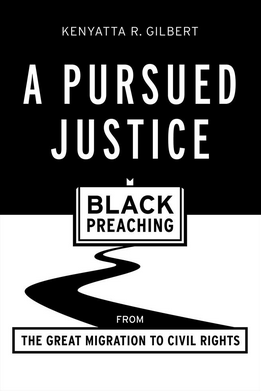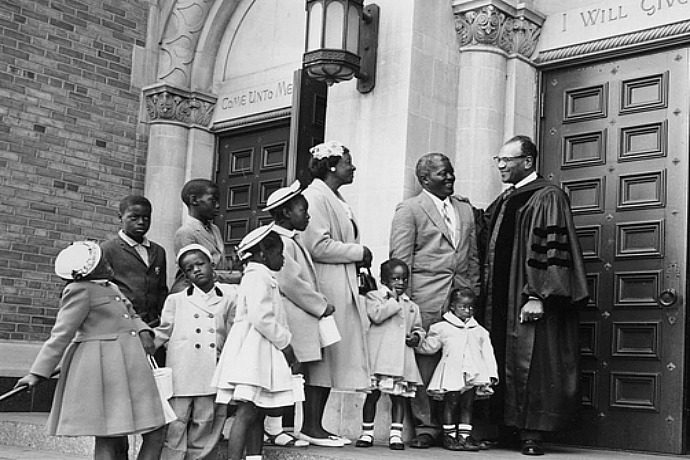What inspired you to write A Pursued Justice: Black Preaching from the Great Migration to Civil Rights?
I take a lot of inspiration from my own spiritual quest toward self-discovery. But as a practical theologian and homiletics professor, I have written A Pursued Justice to answer three questions posed in the book: What does it mean to preach prophetically? Why is it important to discuss its nature and function in context-specific ways? And what must be the scope of prophetic preaching in the postmodern context?
I wanted to write a book that gave even treatment of Black preaching as a distinctive religious discourse in North America. Too long has its genius been relegated to delivery and performance alone. And outside dreadful caricature, the wider culture remains badly informed about the social identity of and functional roles performed by Black preachers in our society today. Preachers function from their orientation, which are inseparable from the congregation’s expectation. They come in varied stripes: social activists, social poets, evangelical-moralists, mystic-spiritualists, entrepreneurial agents, clerico-politicians, and rancher-pontiffs.

A Pursued Justice: Black Preaching from the Great Migration to Civil Rights
Kenyatta R. Gilbert
Baylor University Press
August 1, 2016
Through these masks or personas, Black religious leaders have captured the sacred imaginations of the faithful and at the same time have earned worldwide scrutiny. This gives some explanation, for example, regarding why you could see two diametrically opposed Black reverend types on the major stages of the RNC and DNC. At one pole, you have South Carolinian Black pastor and Trump surrogate Mark Burns, who offered an inappropriate partisan benediction, spoken to demonize Hillary Clinton and pronounced divine blessing on Trump. And at the other pole, you have North Carolinian Pastor Rev. William Barber of the NAACP and the Moral Monday’s movement offering a prophetic call to the nation to address its “heart problem,” i.e., its failure to come to terms with racial injustice and socioeconomic disparity.
I also wanted to write a book that would honor the legacy of my freedom-fighting deceased father, Robert L. Gilbert, who was Baylor University’s first African-American graduate in 1967. A man who dared to walk the campus when white students reputedly threw rocks at Black people who dared to walk across the campus.
I wanted to write a book that would honor the legacy of clergy leaders like Dr. Gardner C. Taylor, a world-traveled Brooklyn pastor regarded as the “Dean of Black Preachers” and one of the most effective preachers in the English-speaking world. I wanted to honor the legacy of the Rev. Clementa Pickney who was assassinated by a white supremacist along with eight other parishioners, many of whom served on the church’s ministry staff, while at a Bible study.
I was inspired by the preaching lives of the three inventive Black clerics prominently featured in the book, who rose up within their congregations and from their pulpits “spoke truth to power” in response to the largest internal migration in our nation’s history. I figured that if I told their story well, through the textured lens of personal biography and sermon analysis, I would not only honor them, but I would better position readers to enter the lifeworld of African-American Christian sacred practices. I would honor a tradition and help the human community to see a rich and complicated history and discover its worth and pedagogical usefulness. This history expands the angle of vision of other communities who would dare to own their narratives, by offering an encounter with the tradition that helped to end slavery and birth the Civil Rights movement, but which now calls all communities to give an account of their social deeds and misdeeds.
I wrote this book to inspire hope in coming generations who will look at the turbulent realities of our times and be in search of a roadmap for offering their times a historical bridge for people to keep hoping against hope.
What’s the most important take-home message for readers?
We are all journeying people who construct our identities from communal narratives shaped by migrations, both literally and symbolically, voluntary and involuntary. We are formed religiously and socially consequent to the effects of migratory movement.
Another takeaway is a message that hopes to reconfigure the facts: clergy leaders working today are all johnny-come-latelies to a venerable tradition traceable to the message of the Hebrew prophets. We preachers who have come of age in the 21st century stand on tall shoulders and drink from cisterns and wells we did not dig. I, just as King, am a progenitor of a distinctive prophetic preaching tradition born from struggle, one that carries a justice-seeking and hope-seeking mission (although masked, blurred, and distorted in many ways in America and around the world today) to unmask systemic evils and deceptive human practices while remaining hopeful in the face of human tragedy and communal despair. Filtered and contextually-shaped, prophetic preaching is in the end a God-summoned, humanizing speech about telling the truth so that human flourishing is made possible in a deathly world.
Is there anything you had to leave out?
As the subtitle indicates, my book’s treatment of the subject matter ends with an analysis of sermons preached by clergy of the post-civil rights era. I had written an additional chapter on African-American postmodern preachers who are carrying the prophetic preaching tradition forward in various spaces of influence. That chapter had to be left on the chopping block, but thankfully the substance of it has resurfaced in my forthcoming work.
What are some of the biggest misconceptions about your topic?
Perhaps the most common misconception about African-American prophetic preaching is that it began or came into flower with the preaching of Dr. Martin Luther King, Jr. and other preachers of civil disobedience during the racial justice movements of the 1950s and 1960s. But King’s justice cries were offspring of earlier venerable prophetic Black preaching that found expression in the wake of a failed Reconstruction period, widespread agricultural depression, the rise of Jim Crow laws, and America’s entry into WWI.
Did you have a specific audience in mind when writing?
I wrote this book for theological scholars, religious historians, migration scholars, and readers interested in obtaining a better grasp on understanding the complex lifeworld of the African-American preacher.
Are you hoping to just inform readers? Entertain them? Piss them off?
I wanted to do more than set forth a descriptive project. I have sought to offer a moral challenge to America. On one hand I want to unsettle Black preachers who have become confused about their mission and message to the African American community. On the other, I hope this book will inform our wider society about the corrosive and destructive effects of the prosperity gospel and individualistic Christianity, the enthronement of white supremacy, America’s doctrine of exceptionalism and failure to deal with its past and present sins, and the socially deteriorating effects that stem from the loss of centers and anchor institutions in African-American communities today that adversely effect us all.
What alternative title would you give the book?
I initially proposed the title “Exodus Preaching: The Prophetic Word in the Great Migration.” I hated to lose it, but I lost that battle with my publisher. Others were proposed but the present one came as a great alternative, I think.
How do you feel about the cover?
I think the simple, yet bold black and white text and images catch the eye and signal that this book will address issues pertaining to race, and from a distinctive perspective. I’m not quite sold on the road image but it attempts to convey that obtaining justice and freedom is a journey—one that requires getting on the road with the support of God and a committed community actively practicing hope.
Is there a book out there you wish you had written? Which one? Why?
I find writing to be a deeply spiritual experience, and I believe I write and should write books that I alone can and am supposed to write. The one book that gave me inspiration along the way was Pulitzer-prize winning author Isabel Wilkerson’s The Warmth of Other Suns: The Epic Story of the Great Migration. Wilkerson’s wickedly-penned, magisterial book is destined to be a classic. It is thoroughly researched but has left enough room for me to fill an important gap that she overlooks and underplays. She does not adequately attend to the vital roles the African-American preacher and African-American preaching played in shaping the course of the largely leaderless movement of more than 1.5 million southern Black migrants who exited the South between 1916 and 1940, staking it all in search of America’s Promised Land in the industrial North.
What’s your next book?
I have a book titled Exodus Preaching: Shaping Sermons for the Here-And-Now under contract with Abingdon Press due out in 2017. It is a practical companion to A Pursued Justice. The readership I have in mind is working clergy and clergy aspirants. Drawing on the sermons and collective wisdom of some of the most creative and socially engaged African-American postmodern preachers, I offer this work as a how-to informed by why-to guide for shaping and developing meaningful justice and hope sermons in crisis times.





